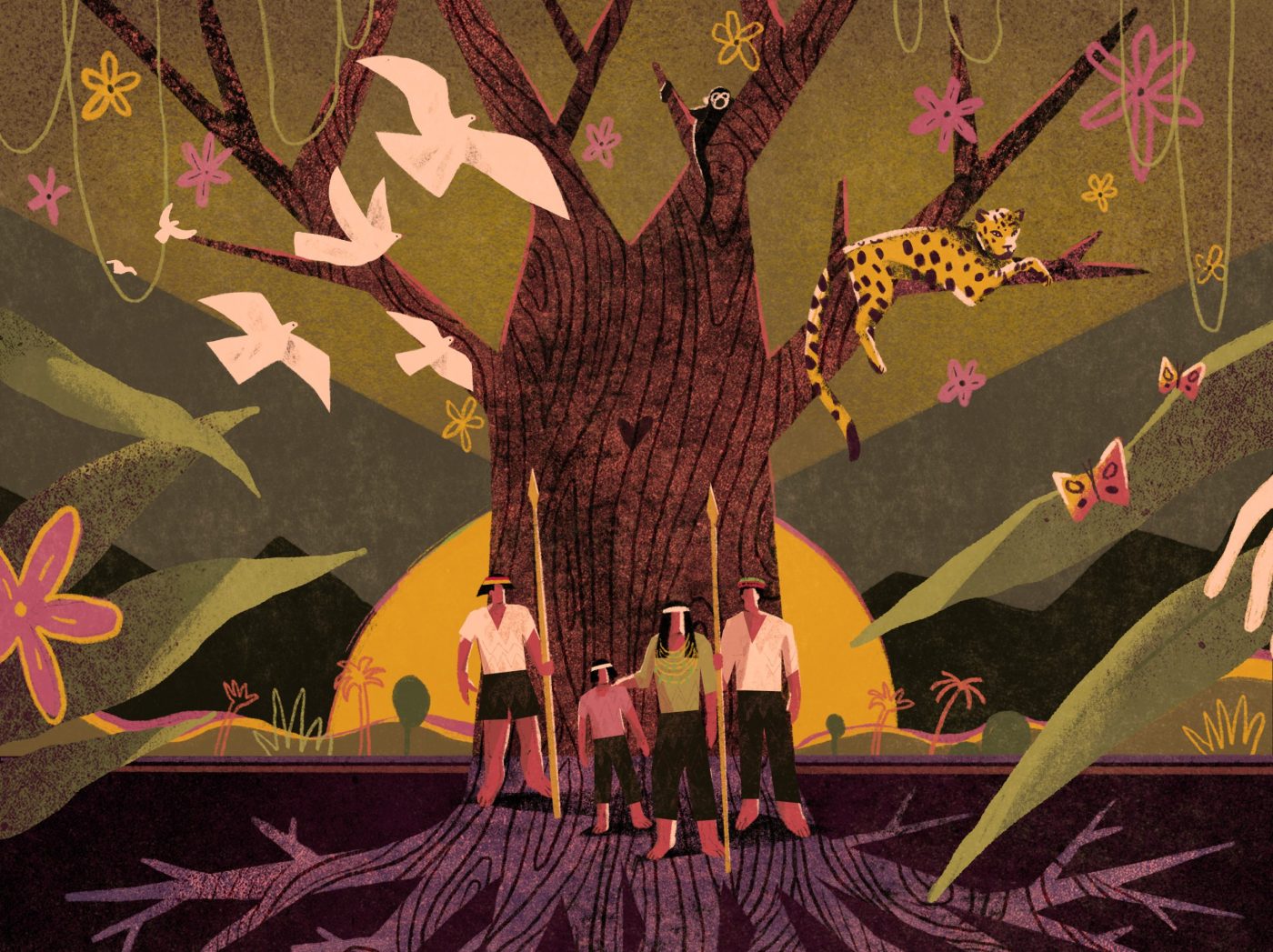In March of 2023, the Indigenous communities of Cuatro Cuencas, in the Loreto district of Peru, sought justice for the widespread human rights harms and environmental degradation generated by oil company PlusPetrol Norte, and condoned by the Peruvian Ministry of Energy and Mines. The communities had won a favorable decision at a federal court in 2021, with the court of Loreto finding that the Cuatro Cuencas had the legal right to their ancestral lands, and ordered the company to compensate the community for the destruction. PlusPetrol Norte and the Peruvian State appealed. To support Cuatros Cuencas in their quest to secure #landjustice for their communities, Oxfam America has penned an Amicus Curiae. The amicus highlights the responsibility of the Peruvian government to uphold the land rights of communities protected in international law. Read more from Oxfam lead attorney Diana Kearney below!
Hi Diana! Thank you for meeting with us today. Can you describe the role of an amicus in the case of las Cuatros Cuencas?
Thanks so much for taking the time to speak with me! Sure, the phrase “amicus curiae” literally means “a friend of the court.” The role of an amicus brief is to provide expertise on a particular area of fact or law that the court might not be able to get from the plaintiff or the defendant. The amicus introduces external expertise that the court should weigh when particular fact or body of law could be potentially dispositive in the court’s decision, or could otherwise influence the judge’s decision-making process. Additionally, sometimes there is a gap between national and international legal obligations, and we want to make sure that judges are holding companies and governments accountable to the highest possible standard to which they are legally bound, which often is international human rights law. So, the amicus plays a really important role in making sure that those internationally guaranteed protections– like the right to food, the right to water, and the right to self-determination– are respected even if local laws fail to uphold these rights. So that is what we were doing in this particular case.
We understand that free, prior, and informed consent (FPIC) was the cornerstone of the case presented by Cuatros Cuencas in March. Can you discuss the role of this argument in the context of the amicus?
The first key message of the amicus is that Indigenous people have the right to possess, control, and dispose of their own ancestral lands and natural resources. This principle forms the foundation of the right of Indigenous communities to give their free, prior, and informed consent before any of their lands or natural resource rights are infringed upon. . . The obligation for companies and governments to seek FPIC before they conduct operations on indigenous lands has been repeatedly affirmed by international treaties, the Inter-American Court on Human Rights (IACtHR) and a number of decisions from UN treaty bodies. These legal authorities confirm that Indigenous land rights are grounded in the international right to property, right to life, right to culture, the right to water, the right to be free from racial discrimination, and other fundamental human rights.
When we talk about free, prior, and informed consent, we are essentially saying that before any governments or corporations infringe upon Indigenous land or resource rights, they have to engage in meaningful consultations with communities and actually gain the community’s approval, particularly when the project may have large scale impacts These consultations must be conducted in local languages, and be inclusive of all individuals within indigenous communities, including women, children, and other groups that may be marginalized can weigh in and be informed. In addition, FPIC is not a one-time approval but rather a continuous process: even if the company initially gains consent to break ground on a mining project, for example, they must continually reaffirm that approval through ongoing dialogue with community members as the actual impacts become clear. It bears emphasis that FPIC not only means that communities can withhold their consent, but they can withdraw their consent at any time throughout the project. Finally, if the communities do give their consent, they also must obtain reasonable benefits from the project. That will look different in different contexts, but companies can’t be the only ones reaping profits from the lands where Indigenous communities live.
What you mention is so important. And unfortunately, we rarely see FPIC processes being implemented fairly, right? We often hear about examples of corporations or Governments weakening FPIC processes.
When we see examples of weak attempts of consultation – like government officials or corporate staff getting the approval of a single indigenous leader after flying them on a helicopter to Lima, for example, and excluding the rest of the community from the process – it isn’t FPIC. That type of engagement is not conducted in good faith and is not sincerely intended to understand the community’s wishes. Almost every international legal decision or treaty on this subject emphasizes that there must be meaningful consultation. Something else that authorities underscore is that FPIC should be carried out in step with local traditions. Companies or government officials conducting FPIC must understand how a community customarily engages in decision-making. . . hen these traditional decision-making processes are ignored, it is a cynical attempt by companies to claim they have conducted FPIC. Finally we must understand that “land rights” also means “women’s land rights” which has been recognized by authorities like the UN Economic and Social Committee and the Committee on the Elimination of Discrimination Against Women. Women and girls must be included in the consultation process and afforded the opportunity to provide or withhold their informed consent; given the historical marginalization of women and girls in many Obtaining the consent of one or two alpha males does not constitute consent for a broader community.
The amicus also talks about the responsibilities of governments and companies under international law. Can you explain why such responsibilities bear on a just ruling for this case?
Yes, governments and businesses alike have responsibility to respect human rights under international law. First, the government has a responsibility to ensure that third-party actors operating in their territory are respecting human rights and that any time that there are violations of those human rights the community has access to remedy. This is a proactive obligation, meaning a government agency cannot sit back and passively watch as a company infringes on land rights. Governments must take steps such as passing legislation to safeguard land rights refuse to grant licenses to corporations that intend to operate on indigenous lands without the community’s consent, and hold a company accountable when it land grabs or pollutes communities’ rivers and natural resources.
Corporations also have a direct responsibility under international law to respect human rights, including Indigenous land rights. That obligation is outlined by the United Nations Guiding Principles on Business and Human Rights and affirmed by the Inter-American Court of Human Rights. Companies also have an obligation to provide access to remedy when those rights are violated. These are not just “soft law” norms, but binding law that applies both to Peru and to PlusPetrol Norte.
Do you see any trends across different countries and international tribunals with regard to litigation to protect indigenous land rights?
There is a rise in cases where we see communities filing to protect their land rights, at the national, regional, and international levels. This is in large part because companies are increasingly encroaching onto Indigenous lands as they try to grab up more and more natural resources. We are seeing increases in cases across Africa, Europe, and Latin America. The exception is in Asia, not because there aren’t as many incursions onto Indigenous lands – in fact, quite the opposite, particularly in countries like Indonesia and the Philippines, which are really under assault as business expand palm oil, timber, and even tourism operations – but because there is no regional human rights court [in Asia]. Furthermore, civil society is much more constricted, so it is not always safe for communities there to file complaints.
However, in Europe, Africa, and Latin America we are seeing an increase in land rights cases. This is occurring in national courts, regional human rights courts and UN treaty bodies. Typically, we think about agribusiness or mining companies that are grabbing indigenous lands, but any time a company is land intensive (e.g., their operations are particularly extractive or destructive to the local environment, such as oil and gas or infrastructure projects) or extensive (e.g., their operations require large plots of land), they are likely to wreck havoc on the local community’s ability to remain on their land or harvest their natural resources. We are also seeing tourism as something that increasingly leads to land conflicts. We have also been seeing more cases coming out of Northern Europe, such as the Indigenous Saami people of Sweden, for example, challenging the Swedish government for failure to respect their land rights. So yes, we are seeing quite an expansion of land rights cases– which on the one hand is disturbing because it may signal an increase in incursions, but there is something that is encouraging about it too. We see more and more Indigenous communities standing up for their rights.
Diana Kearney is the Senior Legal and Shareholder Advocacy Advisor at Oxfam America, where she leads the organization’s legal and shareholder proposal activism.
More on Diana here: https://www.oxfamamerica.org/explore/people/diana-kearney/




